人教版英语八年级上册Unit 2
八年级上册英语unit2知识点人教版

八年级上册英语unit2知识点人教版Unit2主要涉及的知识点包括:一般现在时、第三人称单数形式、时间状语、频率副词、情态动词can及其用法、情态动词must及其用法、情态动词should及其用法。
一、一般现在时一般现在时是表示经常性、习惯性或普遍真理的动作或状态。
其构成为“主语+现在时动词原形”。
例如:She sings very well. (她唱歌非常好。
)He usually goes to school by bike. (他通常骑自行车上学。
)二、第三人称单数形式第三人称单数形式是在一般现在时的基础上加上s或es。
需要注意的是,如果动词以sh、ch、x、o结尾,应在动词后面直接加es。
例如:He plays basketball very well. (他打篮球非常好。
)She teaches English to us. (她教我们英语。
)三、时间状语时间状语是指在句子中修饰时间的词汇。
常用的时间状语包括:always、usually、often、sometimes、rarely、never等。
例如:I always get up early in the morning. (我总是早起。
)He never eats junk food. (他从不吃垃圾食品。
)四、频率副词频率副词是指表示动作发生次数的副词。
常用的频率副词包括:always、usually、often、sometimes、rarely、never等。
例如:We usually eat breakfast at home. (我们通常在家吃早餐。
)She rarely goes to the movies. (她很少去看电影。
)五、情态动词can及其用法can表示“能够”,用于表示某人能够做某事。
can的否定式为can't。
例如:I can swim very well. (我会游泳。
)He can't play soccer. (他不会踢足球。
人教版英语八年级上册Unit2 知识清单
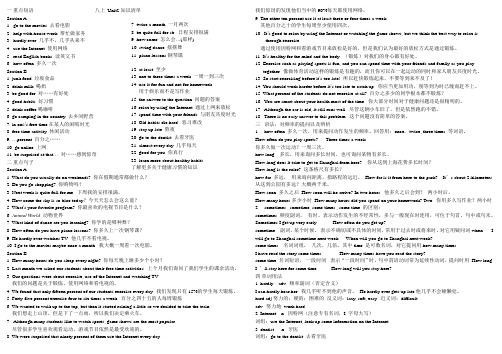
一.重点短语 八上 Unit2知识清单 Section A1. go to the movies 去看电影2. help with house work 帮忙做家务3. hardly ever 几乎不,几乎从来不4. use the Internet 使用网络5. read English books 读英文书6. how often 多久一次Section B1. junk food 垃圾食品2. drink milk 喝奶3. be good for 对……有好处4. good habits 好习惯5. drink coffee 喝咖啡6. go camping in the country 去乡间野营7. in on e’s free time 在某人的闲暇时光8. free time activity 休闲活动9. …percent 百分之……10. go online 上网11. be surprised at/that … 对……感到惊奇二.重点句子Section A1. What do you usually do on weekends? 你在假期通常都做什么?2. Do you go shopping? 你购物吗?3. Next week is quite full for me. 下周我的安排很满。
4. How come the sky is so blue today ?今天天怎么会这么蓝?5. What ’s your favorite program? 你最喜欢的电视节目是什么?6. Animal World 动物世界7. What kind of dance are you learning? 你学的是哪种舞? 8. How often do you have piano lessons? 你多久上一次钢琴课? 9. He hardly ever watches TV. 他几乎不看电视。
人教版八年级英语上册Unit 2重要知识点讲解

Unit2How often do you exercie?重要知识点讲解惯用法:1. help sb. with sth 帮助某人做某事2. How about…? ….怎么样?/ ….好不好?3. want sb. to do sth. 想让某人做某事4. How many + 可数名词复数+ 一般疑问句….有多少…..5. 主语+ find+ that 从句…发现…6. It’s + adj.+ to do sth. 做某事是….的7. spend time with sb. 和某人一起度过时光8. ask sb. about sth. 向某人询问某事9. by doing sth. 通过做某事10. What’s your favorite…..? 你最喜欢的……是什么?11 start doing sth. 开始做某事12. the best way to do sth.做某事的最好方式词语辨析:1. how often 多久一次,用来提问动作发生的频率。
回答用:once,twice, three times 等词语。
How often do you play sports? Three times a week.how long 多长,用来询问多长时间,也可询问某物有多长。
How long does it take to get to Shanghai from here? How long is the ruler?how for 多远,用来询问距离,指路程的远近。
How far is it from here to the park? It’s about 2 ki lometers.2.free 空闲的,有空的,反义词为busy.be free 有空,闲着,相当于have time.I’ll be free next week. = I’ll have time next week.还可作“免费的、自由的”解。
人教版八年级英语上册Unit2知识点汇总总结
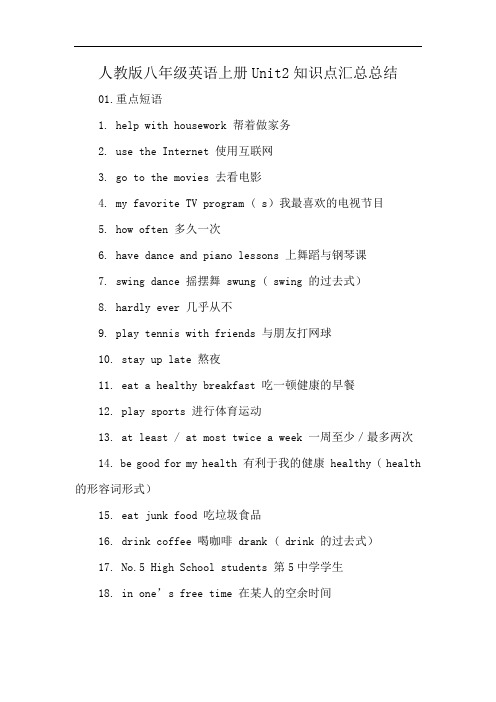
人教版八年级英语上册Unit2知识点汇总总结01.重点短语1. help with housework 帮着做家务2. use the Internet 使用互联网3. go to the movies 去看电影4. my favorite TV program ( s)我最喜欢的电视节目5. how often 多久一次6. have dance and piano lessons 上舞蹈与钢琴课7. swing dance 摇摆舞 swung ( swing 的过去式)8. hardly ever 几乎从不9. play tennis with friends 与朋友打网球10. stay up late 熬夜11. eat a healthy breakfast 吃一顿健康的早餐12. play sports 进行体育运动13. at least / at most twice a week 一周至少/最多两次14. be good for my health 有利于我的健康 healthy ( health 的形容词形式)15. eat junk food 吃垃圾食品16. drink coffee 喝咖啡 drank ( drink 的过去式)17. No.5 High School students 第5中学学生18. in one’s free time 在某人的空余时间19. ask them about their free time activities 询问他们关于他们的业余活动20. not … at all 根本不…21. go online 上网22. be surprised that ..感到惊讶23. use it for fun 为了取乐而使用它24. the answers to the questions 这些问题的答案25. one to three times a week 一周一到三次26. two percent of the students 2%的学生27. the best way to do sth.做某事的最好方式28. such as 例如29. spend time with your friends 与你的朋友共度时光spent ( spend 的过去式)30. spend time on sth./ in doing sth.花时间在某事上/做某事31. play together 一起玩32. watch TV for over 2 hours 看两个多小时电视33. go to the dentist 去看牙医34. a 16-year-old high school student 一名16岁的中学生35. have a lot of good habits 有许多好习惯36. more / less than two hours 多/少于两小时37. go to the dentist for teeth cleaning 去牙医处清洁牙齿38. go to the shopping center 去购物中心02.重点句子语法聚焦1. --What do you usually do on weekends?你在周末通常做什么?--I always exercise.我总是锻炼。
人教版八年级上册英语unit2知识点及习题

人教版八年级上册英语unit2知识点及习题XXX the words "sometimes" and "XXX"。
"XXX。
while "sometime" means at some point in time。
For example。
in Unit 2 of our textbook。
we learn how often we exercise。
We can use phrases like "hardly ever"。
which means almost never。
or "once a week"。
which means once every seven days。
Some people exercise twice a month。
while others exercise every day。
In our free time。
we might help with housework or go to the movies。
use the。
or learn swing dance。
We might play tennis or stay up late。
but it'XXX。
XXX percent of the students have dance and piano lessons。
and many play sports or go XXX are good for our physical and mental health。
However。
old habits die hard。
and some people may not enjoy exercise at all。
In their free time。
they might read books or watch TV instead。
人教版八年级英语上册Unit2单词及短语(附例句)
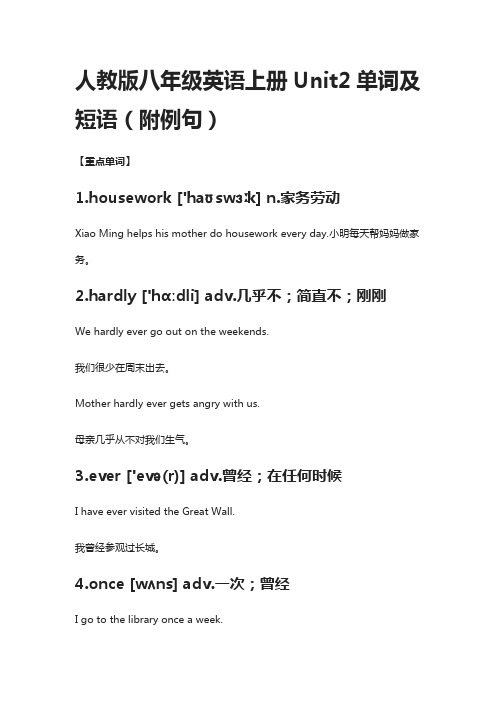
人教版八年级英语上册Unit2单词及短语(附例句)【重点单词】1.housework ['haʊswɜːk] n.家务劳动Xiao Ming helps his mother do housework every day.小明每天帮妈妈做家务。
2.hardly ['hɑːdli] adv.几乎不;简直不;刚刚We hardly ever go out on the weekends.我们很少在周末出去。
Mother hardly ever gets angry with us.母亲几乎从不对我们生气。
3.ever ['evə(r)] adv.曾经;在任何时候I have ever visited the Great Wall.我曾经参观过长城。
4.once [wʌns] adv.一次;曾经I go to the library once a week.我每周去一次图书馆。
5.twice [twaɪs] adv.两倍;两次You can't go to the same place twice.你不可能两次去同一个地方。
6.Internet ['ɪntənet] n.因特网We can get a lot of information from the Internet.我们可以从互联网上得到很多信息。
7.program ['prəʊɡræm] n.节目;程序;课程;节目单This TV program is the best of all.这个电视节目是所有节目中最好的。
This TV program is much better than that one这个电视节目比那个好得多8.full [fʊl] adj.满的;充满的;完全的The bottle is full of milk.瓶子里装满了牛奶。
9.swing [swɪŋ] n.摇摆;秋千v.摇摆;旋转The little sister is swing with her friends.小妹妹正在和她的朋友们荡秋千。
人教版英语八年级上册Unit2知识点总结与训练
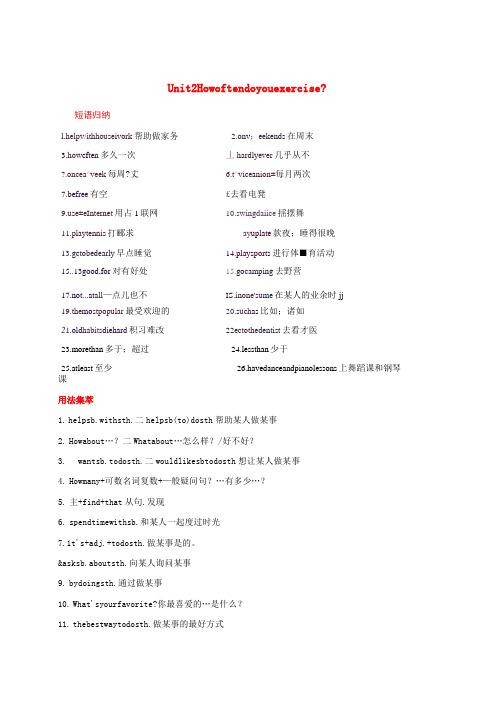
Unit2Howoftendoyouexercise?短语归纳l.helpv/ithhouseivork帮助做家务 2.onv;eekends在周末3.how cften多久一次丄hardlyever几乎从不.oncea^veek每周?丈 6.t^vice a nion±每月两次7.befree有空£去看电凳e±eInternet用占1联网10.swingdaiice揺摆舞11.playtennis打郦求ay uplate款夜;睡得很晩13.gctobedearly早点睡觉14.playsports进行体■育活动15..13good,for对有好处15.gocamping去野营17.not...at all—点儿也不IS.inone's ume在某人的业余时jj19.the mo stpopular最受欢迎的20.such as比如;诸如21.old habits diehard积习难改22ec tothe dentist去看才医23.morethan多于;超过24.lessthan少于25.atleast至少26.havedanceandpianolessons上舞蹈课和钢琴课用法集萃1.helpsb.withsth.二helpsb(to)dosth帮助某人做某事2.Howabout…?二Whatabout…怎么样?/好不好?3.wantsb.todosth.二wouldlikesbtodosth想让某人做某事4.Howmany+可数名词复数+—般疑问句?…有多少…?5.主+find+that从句.发现6.spendtimewithsb.和某人一起度过时光7.1t's+adj.+todosth.做某事是的。
&asksb.aboutsth.向某人询问某事9.bydoingsth.通过做某事10.What'syourfavorite?你最喜爱的…是什么?11.thebestwaytodosth.做某事的最好方式。
人教版八年级英语上册Unit2知识点精讲

Unit 2 How often do you exercise?一、词汇应用1.on weekends 在周末2.help with housework 帮忙做家务3.hardly ever 几乎从不4.go shopping 去购物5.once a week / month 一周 / 月一次6.twice / three times a week一周两 / 三次e the Internet 使用互联网8.read English books 阅读英文书籍9.go to the movies 去看电影10.favorite program 最喜欢的节目11.swing dance 摇摆舞12.have piano lessons 上钢琴课13.drink milk 喝牛奶14.stay up late 熬夜15.go online 上网16.play sports 做运动17.eat a healthy breakfast 吃健康的早餐18.at least 至少;不少于;起码19.go to bed early 早早上床睡觉20.junk food 垃圾食品21.be good for one's health对某人的健康有好处22.have good / bad habits 有好 / 坏习惯23.play computer games 玩电脑游戏24.the answer to the question 问题的答案25.... percent of the students百分之……的学生26.such as 例如;像……这样27.draw pictures 画画28.watch TV for over 2 hours看两个多小时的电视29.go to the dentist 看牙医30.teeth cleaning 洗牙31.more than 多于32.less than 少于33.want sb. to do sth. 想让某人做某事34.ask sb. about sth.询问某人关于某事的情况35.How come? 怎么会呢?36.Old habits die hard. 旧习难改。
八年级上册英语人教版unit2知识点
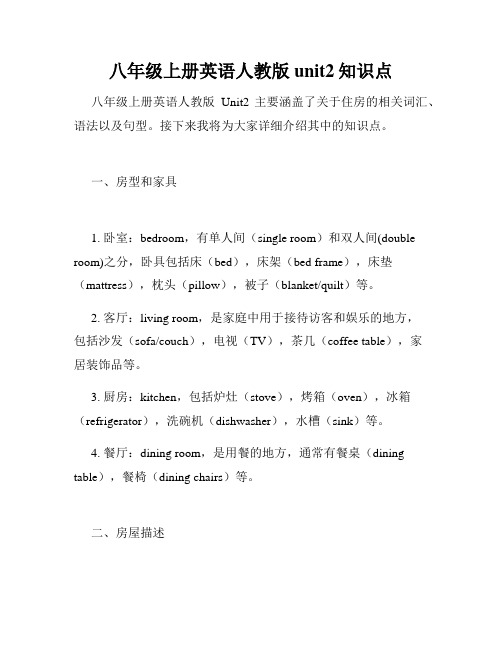
八年级上册英语人教版unit2知识点八年级上册英语人教版Unit2主要涵盖了关于住房的相关词汇、语法以及句型。
接下来我将为大家详细介绍其中的知识点。
一、房型和家具1. 卧室:bedroom,有单人间(single room)和双人间(double room)之分,卧具包括床(bed),床架(bed frame),床垫(mattress),枕头(pillow),被子(blanket/quilt)等。
2. 客厅:living room,是家庭中用于接待访客和娱乐的地方,包括沙发(sofa/couch),电视(TV),茶几(coffee table),家居装饰品等。
3. 厨房:kitchen,包括炉灶(stove),烤箱(oven),冰箱(refrigerator),洗碗机(dishwasher),水槽(sink)等。
4. 餐厅:dining room,是用餐的地方,通常有餐桌(dining table),餐椅(dining chairs)等。
二、房屋描述1. 地理位置:the location of the house。
例如:Our new house is located at the heart of the city.2. 房屋类型:the type of the house。
例如:She lives in a two-story house with a garden.3. 房屋朝向:the orientation of the house。
例如:Our house faces east, so we can enjoy the sunrise every morning.4. 房间大小:the size of the room。
例如:The living room is spacious enough to accommodate a large sofa and a coffee table.5. 装修风格:the style of the decoration。
人教版八年级英语上册第二单元知识点

人教版八年级英语上册第二单元知识点摘要:I.单元简介A.单元主题B.单元目标C.单元结构II.词汇与语法A.词汇1.名词2.动词3.形容词4.副词B.语法1.一般现在时2.一般过去时3.一般将来时III.句型与对话A.句型1.疑问句2.祈使句3.感叹句B.对话1.日常问候与介绍2.家庭与朋友3.学校生活IV.阅读理解A.文章概述B.问题与解答V.听力理解A.听力材料B.问题与解答VI.写作训练A.写作主题B.写作要求C.写作示例VII.单元总结A.重点知识点回顾B.学习建议正文:人教版八年级英语上册第二单元以日常交际为主题,通过各种语言技能训练,帮助学生掌握基本的日常英语交流能力。
本单元的目标是让学生学会使用一般现在时、一般过去时和一般将来时表达现在、过去和未来的情况,同时学习并运用各种词汇、语法、句型和对话,提高学生的英语综合素质。
一、词汇与语法本单元的词汇包括名词、动词、形容词和副词。
学生需要掌握这些词汇的用法,以便在实际交流中准确表达意思。
在语法方面,本单元主要教授一般现在时、一般过去时和一般将来时,帮助学生更好地描述日常生活中的各种情况。
二、句型与对话本单元介绍了疑问句、祈使句和感叹句等句型,以及日常问候与介绍、家庭与朋友、学校生活等场景的对话。
学生需要熟练掌握这些句型和对话,以便在实际交流中更加自信地表达自己。
三、阅读理解本单元的阅读理解部分提供了多篇与主题相关的文章,学生需要通过阅读这些文章,理解文章内容,并回答相关问题。
这有助于提高学生的阅读理解能力,培养他们的英语思维。
四、听力理解听力理解部分为学生提供了与主题相关的听力材料,学生需要听懂材料内容,并回答相关问题。
通过听力训练,学生可以提高自己的听力水平,更好地理解和运用英语。
五、写作训练本单元的写作训练要求学生根据主题进行写作,学会用英语表达自己的观点和想法。
通过写作训练,学生可以巩固所学知识,提高自己的英语写作能力。
总之,本单元为学生提供了一个全面、系统的英语学习环境,通过各种语言技能训练,帮助学生掌握基本的日常英语交流能力。
人教版八年级英语上册Unit2知识点精讲
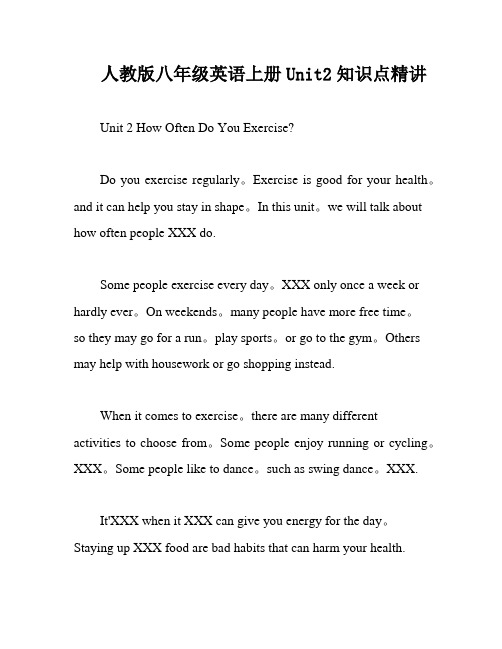
人教版八年级英语上册Unit2知识点精讲Unit 2 How Often Do You Exercise?Do you exercise regularly。
Exercise is good for your health。
and it can help you stay in shape。
In this unit。
we will talk about how often people XXX do.Some people exercise every day。
XXX only once a week or hardly ever。
On weekends。
many people have more free time。
so they may go for a run。
play sports。
or go to the gym。
Others may help with housework or go shopping instead.When it comes to exercise。
there are many different activities to choose from。
Some people enjoy running or cycling。
XXX。
Some people like to dance。
such as swing dance。
XXX.It'XXX when it XXX can give you energy for the day。
Staying up XXX food are bad habits that can harm your health.According to a survey。
more than 70 percent of the students in our school XXX do activities such as playing sports。
人教版八年级上册英语Unit 2知识点梳理及语法讲义(学生版)
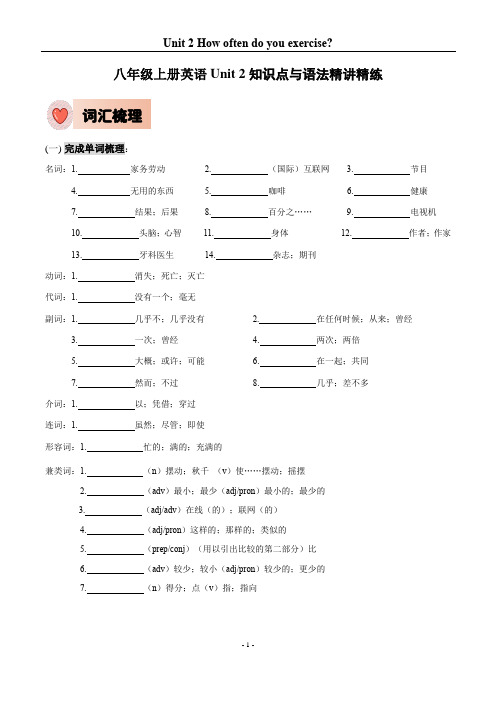
八年级上册英语Unit 2知识点与语法精讲精练词汇梳理(一)完成单词梳理:名词:1. 家务劳动 2. (国际)互联网 3. 节目4. 无用的东西5. 咖啡6. 健康7. 结果;后果8. 百分之……9. 电视机10. 头脑;心智11. 身体12. 作者;作家13. 牙科医生14. 杂志;期刊动词:1. 消失;死亡;灭亡代词:1. 没有一个;毫无副词:1. 几乎不;几乎没有 2. 在任何时候;从来;曾经3. 一次;曾经4. 两次;两倍5. 大概;或许;可能6. 在一起;共同7. 然而;不过8. 几乎;差不多介词:1. 以;凭借;穿过连词:1. 虽然;尽管;即使形容词:1. 忙的;满的;充满的兼类词:1. (n)摆动;秋千(v)使……摆动;摇摆2. (adv)最小;最少(adj/pron)最小的;最少的3. (adj/adv)在线(的);联网(的)4. (adj/pron)这样的;那样的;类似的5. (prep/conj)(用以引出比较的第二部分)比6. (adv)较少;较小(adj/pron)较少的;更少的7. (n)得分;点(v)指;指向(二) 词汇变形小结:1. one (num. 一) — (adv. 一次) — (第一)2. two (num. 二) — (adv.两次)— (第二)3. swing (v. 使……摆动) — (过去式)4. little (adj. 少的) — (比较级:更少的) — (最高级:最少的)5. health (n. 健康) — (adj. 健康的) — (adv. 健康地)— (反义词:不健康的) — (反义词:不健康地)6. die (v. 死) — (n. 死亡) — (adj. 垂死的) — (adj. 死的)7. write (v. 写) — (n. 作者;作家)【练一练】用所给词的适当形式填空1.Most parents don’t think it is ______________(health)for children to stay up too late at night.o She is a great ______________(write)and he’s especially famous for his play, Teahouse.3.If people don’t exercise, the illness can go into their ______________ (body) easily.4.It takes ______________(little)time to go there by underground than by bus.5.Jim got ten ______________ (point)in the basketball match.6.Take the medicine______________(two) a day, and you’ll feel better.7.Jack ______________(do) his homework every day.8.Mr. Li______________(teach) English in our school five years ago.9.At______________(little)ten students were late for school this morning.10.Many boys like playing football because they think it’s______________(relax).(三) 短语攻关:在周末上网几乎从不多久一次一周一次一周两次一周四到六次使用互联网去看电影熬夜至少对……有好处做运动打网球在某人的空闲时间去看牙医摇摆舞做家务垃圾食品例如怎么会呢?……的答案多于少于知识点梳理1.help with housework 帮忙做家务【用法详解】help sb with sth 表示在某方面帮助某人(帮助某人做某事),with后常跟名词或代词作宾语。
八年级上册英语unit2知识点归纳人教版
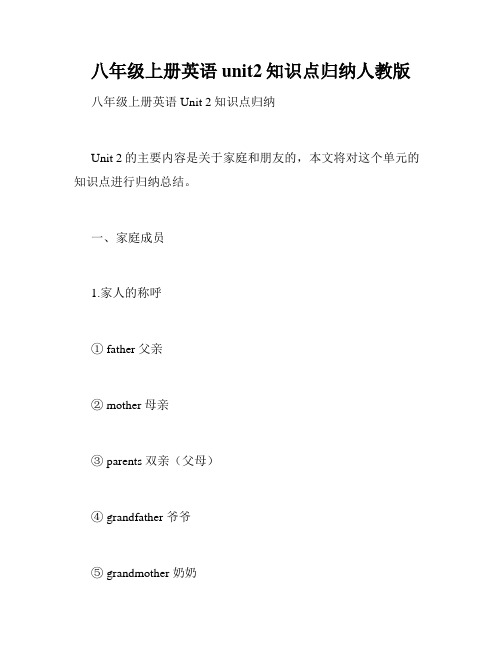
八年级上册英语unit2知识点归纳人教版八年级上册英语Unit 2知识点归纳Unit 2的主要内容是关于家庭和朋友的,本文将对这个单元的知识点进行归纳总结。
一、家庭成员1.家人的称呼① father 父亲② mother 母亲③ parents 双亲(父母)④ grandfather 爷爷⑤ grandmother 奶奶⑥ grandparents 祖父母(外公外婆或者爷爷奶奶)⑦ son 儿子⑧ daughter 女儿⑨ children 孩子⑩ elder brother 哥哥⑪ younger brother 弟弟⑫ elder sister 姐姐⑬ younger sister 妹妹2.家庭成员的职业father:teacher, doctor, businessman, worker…mother:nurse, musician, artist, housewife…grandfather / grandmother:retired, farmer, scientist, writer…brother / sister:student, athlete, musician, artist, …二、家务1.厨房用具① microwave 微波炉② refrigerator 冰箱③ stove 火炉④ oven 烤箱⑤ blender 搅拌器⑥ toaster 烤面包机⑦ kettle 水壶2.家务动词① cook 做饭② wash the dishes 洗碗③ sweep 扫地④ mop 拖地⑤ clean the bathroom 打扫浴室⑥ make the bed 整理床铺⑦ do the laundry 洗衣服三、朋友1.朋友类型① best friend 最好的朋友② close friend 亲密的朋友③ new friend 新朋友④ childhood friend 童年时的朋友⑤ schoolmate 同学2.谈论朋友的习惯和特点① He / She is always there for me. 他 / 她总是在我身边。
人教版八年级上册英语 Unit 2 词汇和语法基础(解析版)
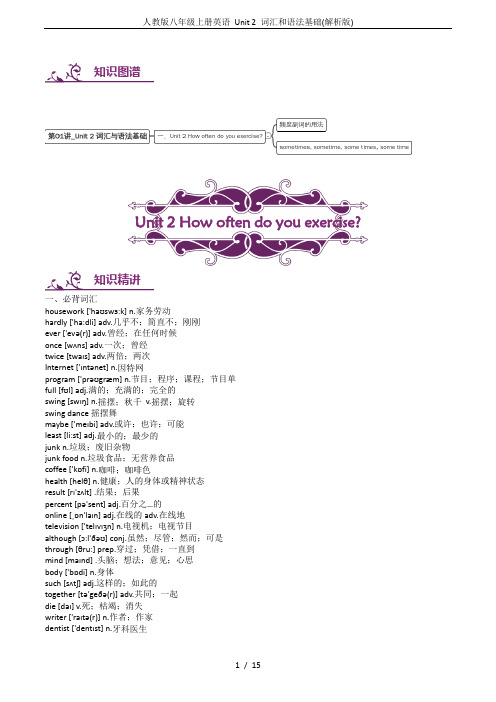
知识图谱Unit 2 How often do you exercise?知识精讲一、必背词汇housework ['haʊswɜːk] n.家务劳动hardly ['haːdli] adv.几乎不;简直不;刚刚ever ['evə(r)] adv.曾经;在任何时候once [wʌns] adv.一次;曾经twice [twaɪs] adv.两倍;两次Internet ['ɪntənet] n.因特网program ['prəʊgræm] n.节目;程序;课程;节目单full [fʊl] adj.满的;充满的;完全的swing [swɪŋ] n.摇摆;秋千v.摇摆;旋转swing dance摇摆舞maybe ['meɪbi] adv.或许;也许;可能least [liːst] adj.最小的;最少的junk n.垃圾;废旧杂物junk food n.垃圾食品;无营养食品coffee ['kɒfi] n.咖啡;咖啡色health [helθ] n.健康;人的身体或精神状态result [rɪ'zʌlt] .结果;后果percent [pə'sent] adj.百分之…的online [ˌɒn'laɪn] adj.在线的adv.在线地television ['telɪvɪʒn] n.电视机;电视节目although [ɔːl'ðəʊ] conj.虽然;尽管;然而;可是through [θruː] prep.穿过;凭借;一直到mind [maɪnd] .头脑;想法;意见;心思body ['bɒdi] n.身体such [sʌtʃ] adj.这样的;如此的together [tə'geðə(r)] adv.共同;一起die [daɪ] v.死;枯竭;消失writer ['raɪtə(r)] n.作者;作家dentist ['dentɪst] n.牙科医生magazine ['mægəziːn] n.杂志however [haʊ'evə(r)] adv.然而;无论如何;不管多么than [ðən] conj.比almost ['ɔːlməʊst] adv.几乎;差不多none [nʌn] pron.没有人;没有任何东西,毫无less [les] adj.更少的;较少的point [pɔɪnt] n.看法;要点;重点;小数点;目标;分数二、重点词汇1. program noun /ˈprəʊ.ɡræm/a series of instructions that can be put into a computer in order to make it perform an operation(计算机)程序;编码指令1). She’s written a program to find words that frequently occur together.她设计了一个程序以便找到经常一起出现的词语。
人教版英语八年级上册Unit2 重点词汇及短语解析和汇总
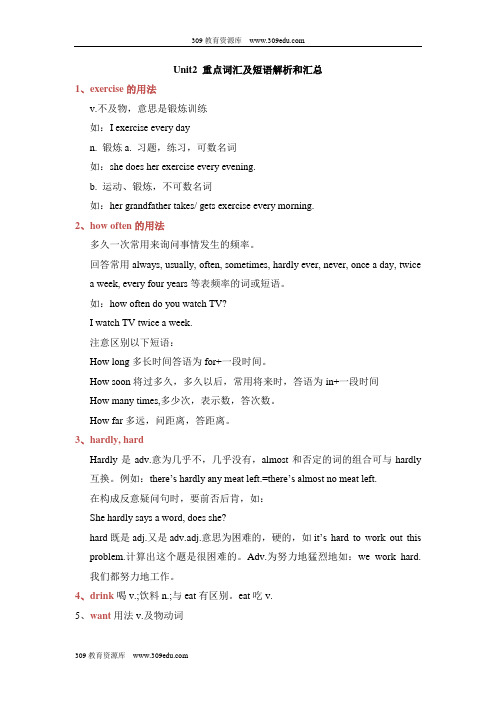
Unit2 重点词汇及短语解析和汇总1、exercise的用法v.不及物,意思是锻炼训练如:I exercise every dayn. 锻炼a. 习题,练习,可数名词如:she does her exercise every evening.b. 运动、锻炼,不可数名词如:her grandfather takes/ gets exercise every morning.2、how often的用法多久一次常用来询问事情发生的频率。
回答常用always, usually, often, sometimes, hardly ever, never, once a day, twicea week, every four years等表频率的词或短语。
如:how often do you watch TV?I watch TV twice a week.注意区别以下短语:How long多长时间答语为for+一段时间。
How soon将过多久,多久以后,常用将来时,答语为in+一段时间How many times,多少次,表示数,答次数。
How far多远,问距离,答距离。
3、hardly, hardHardly是adv.意为几乎不,几乎没有,almost和否定的词的组合可与hardly 互换。
例如:there’s hardly any meat left.=there’s almost no meat left.在构成反意疑问句时,要前否后肯,如:She hardly says a word, does she?hard既是adj.又是adv.adj.意思为困难的,硬的,如it’s hard to work out this problem.计算出这个题是很困难的。
Adv.为努力地猛烈地如:we work hard.我们都努力地工作。
4、drink喝v.;饮料n.;与eat有区别。
eat吃v.5、want用法v.及物动词后跟名词或代词作宾语。
人教版英语八年级上册unit2

Unit 2
一、短语
1.帮忙做家务
2.少于六小时
3.摆手舞节目
4.使用互联网
5.美国青少年杂志
6.一年去看一两次牙医
7.至少50%
8.上网
9.健康的心脑和身体10.一起死亡
11.多于12分12.几乎没有一个作者
13.无价值的结果14.少于六次
二、句子
1.今天天怎么会这么蓝!
2.对我们提出的有关看电视的问题的回答也很有意思。
3.他问了一些有关我们日常习惯的问题。
4.尽管这辆车旧了,但是依然跑得不错。
5.努力的工作是很重要的,但我们也必须有时间放松。
6. 所以赶快锻炼起来,不要等到来不及了!
7.你应当更加用功,别等到为时过晚而赶不上。
8.他多久看一次电视?一周几次吧。
然而他几乎从不锻炼。
人教版初中英语-八年级上册-unit 2知识点+练习

初中英语题集八年级上unit2 How often do you exercise?一.词汇变形单词1.hardly adv.几乎不;简直不;刚刚——hard adj.困难的—— hardness n. 坚硬,硬性2.Internet n.因特网——international adj.国际的—— internationally adv. 国际性的;国际上的3.program n.节目;程序;课程;节目单——programmer n.程序设计者—— programmed v.训练培养4.full adj.满的;充满的;完全的—— fully adv.完全地;充分地—— fuller n. 漂洗工;套锤5.swing n.摇摆;秋千v.摇摆;旋转——swings n. 秋千—— swinging adj. 愉悦的多姿多彩的6.junk n.垃圾;废旧杂物——junky n.吸毒者adj.质量低劣的—— junket n.公费旅游7.health n.健康;人的身体或精神状态—— healthy adj.健康的,健全的—— healthily adv.健康地8.result n.结果;后果—— resulting adj.作为结果的,因而发生的—— resultant n.结果9.percent adj.百分之...的——percentage n.百分比—— percentile n. 百分位10.mind n.头脑;想法;意见;心思—— mindful adj.留心的;注意的——mindless adj. 愚笨的;不小心的11.die v.死;枯竭;消失—— dead adj.死去的完全的—— death n.死亡12.writer n.作者;作家—— writing n. 写作——write v.写13.dentist n.牙科医生—— dentistry n. 牙医学——dental adj.牙齿的牙科的14.teenager n.青少年—— teens n. 十几岁十三到十九的数字——teeny adj. 极小的15.point n.看法;要点;重点;小数点;目标;分数——pointed adj.尖锐的—— pointless adj.无意义的He (几乎不)watches TV.典型例题1.相似题1)She h (几乎不)eats anything.2)In the evening he h (几乎不)exercises.3)We could h (很难)believe our eyes.答案:hardly ever ;hardly ever; hardly ever; hardly2.Our questions were about exercise,use of the (互联网)and watching TV.相似题1)You can find all kinds of information on the (互联网).2)Most of the children like surfing the (互联网).3)(互联网)has changed our life.答案:internet;internet;internet;internet3.What is your favorite (节目)?相似题1)Mary likes the (节目)every much.2)The animal world is always kids’ favorite (节目).3)Tom and john all like the funny (节目).答案:program;program; program;program4.Next week is quiet (满的)for me.相似题1)Her life was too (满的)to find time for hobbies.2)Hotels are often (满的)at this time of the year.3)The bus was (满的)when they got there.答案:full;full;full;full5.Oh, (摇摆)dance,it’s fun.相似题1)(摇摆舞)is a kind of dancing.2)His moods alarmingly.他的心情时好时坏,令人担心.3)You’ve been on the for ten minutes,it’s my go now.你荡秋千有10分钟了,现在该轮到我了。
人教版八年级英语上册Unit2知识点和练习

人教版八年级英语上册Unit2知识点和练习Unit 2 What’s the matter?固定短语1. Have a cold 感冒2. sore back 背痛3. neck and neck 并驾齐驱,齐头并进4. I have a stomachache 我胃痛= I have got a stomachache= There is something wrong with my stomach= My stomach hurts= I have (got) a pain in my stomach5. What’s the matter? 怎么了?= What’s the trouble (with you)?= What’s your trouble?= What’s wrong (with you)?= What’ the matter (with you)?=What has happened to you?= Is there anything wrong (with you)? = what’s up?6. sore throat 咽喉痛7. lie down and rest 躺下休息8. see a dentist 看牙医9. drink lots of water 多喝水10. hot tea with honey 加蜂蜜的热茶11.That’s a good idea 好主意12.That’s too bad 太糟糕了13.I think so 我认为如此14. I’m not feeling well. 我觉得不太舒服= I’m not feeling fine/all right.= I’m feeling ill/sick. =I feel terrible/bad.= I don’t feel well.15. get some rest 多休息16. I have no idea = I don’t know 我不知道17. stressed out 筋疲力18. I am tired 我累了He is tired. 他累了19. a healthy lifestyle健康的生活方式20. traditional Chinese doctors传统中医21. a balance of yin and yang阴阳调和22. you have too much yin.你阴气太盛23. to eat a balance diet饮食平衡24. healthy food 健康食品25. stay healthy 保持健康=keep healthy=keep in good health= keep fit26. enjoy oneself (myself, yourself, herself, himself, themselves, ourselves, itself反身代词) 玩得高兴,过得愉快=have a good time = have a wonderful time= have fun27. enjoy sth. =like sth. (名词)喜欢某物,enjoy doing sth.喜欢做某事=like dong sthpractice doing sth.练习做某事,mind doing sth. 介意做某事,finish doing sth.完成某事,give up doing sth.放弃做某事,can’t help doing sth.忍不住做某事,keep ding sth. 坚持做某事. (keep on doing sth. / keep sb. doing sth. )be busy doing sth. 忙着做某事be used to doing sth.习惯于做某事make a contribution to doing sth.为..做贡献go on doing sth. 继续做某事forget doing sth.忘记做某事remember doing sth. 记得做某事spend....(in) doing sth. 花(时间)来做某事prefer doing sth.to doing sth.比起(做...)来更愿意(做...)28. at the moment = now 此刻29. Host family 东道家庭30. Conversation practice会话练习31. I’m sorry to hear that.听到此事我很难过Section A知识要点1. What’s the matter?这句话通常用于询问别人身体有什么不舒服,或有何麻烦,后跟with构成:What’s the matter with…?类似的句子还有:What’s wrong with…? What’s the trouble with…? 他们的答语往往是表示得了什么病,或什么地方不舒服,常用句型“somebody has/have a+相应的名词”。
人教版英语八年级上册unit 2

Unit 2 I’ll help to clean up the city parks (一)重点词汇、短语和句型重点单词Section A Cheer v.欢呼,喝彩Volunteer v.义务做,自愿做Lonely adj.孤独的,寂寞的Felling n.感觉,感触Joy n.高兴,愉快Journey n.(尤指长途)旅行Alone adv.独自,单独Notice n.通知,通告Several pron.几个,一些Satisfaction n.满足,满意Owner n.物主,主人Sign n.标志,信号Raise v.募集,征集重点单词Section B Repair v.修理,修补Letter n.信,函Blind adj.瞎的,失明的Imagine v.想象,设想Open v打开Carry n.拿;提;扛Excited adj.激动的,兴奋的Kindness n仁慈,善良Understand v.理解,领会Disabled adj.丧失能力的,有残疾的Sir n.先生Fix v.修理,安装Wheel n.车轮,轮子Miss n.女士,小姐Deaf adj.聋的Difficulty n.困难,难题Door n.门Train v.训练,培训Training n.训练,培训Clever adj.聪明的Change v.&n.变化;改变Madam.夫人,女士重点短语Section A Clean up打扫(或清除)干净Give out分发;散发Give away赠送;捐赠Make a difference影响;有作用Put up张贴Care for关怀,照顾Hand out分发;发放Cheer up(使)变得高兴起来,振奋起来Used to曾经。
过去。
Set up建起,设立Put off推迟,拖延Come up with提出,想出At the same time同时Be worried about担心重点短语Section B Run out of用光Fix up修理;修补Be similar to与。
- 1、下载文档前请自行甄别文档内容的完整性,平台不提供额外的编辑、内容补充、找答案等附加服务。
- 2、"仅部分预览"的文档,不可在线预览部分如存在完整性等问题,可反馈申请退款(可完整预览的文档不适用该条件!)。
- 3、如文档侵犯您的权益,请联系客服反馈,我们会尽快为您处理(人工客服工作时间:9:00-18:30)。
Unit 2单项选择1.Tony’s parents thought he was at school, but they found him in ______ Internet in the end.A. AB. AnC. TheD. /2.---The best way to make progress(取得进步) is ______ practice.---I think so.A. WithB. AcrossC. InD. Through3.---Are all of your friends late for your birthday party?---No, ______ of them are late. They come to the party early.A. SomeB. AnyC. NoneD. Few4.The woman ______ leaves her house, because she can’t walk far.A. UsuallyB. EverC. HardlyD. Always5.This book is ______ of pictures. It’s fit(适合) for children.A. DifferentB. RealC. PopularD. Full6.Don’t eat too much junk food. It’s bad for your ______.A. Mouth B, mind C. Health D. Head7.It’s raining hard now. ______, I still want to shopping with my friends.A. SoB. BecauseC. HoweverD. Then8.Mike got ninety-eight ______ and he did best in the math test.A. PointsB. HoursC. MinutesD. Money9.It’s ______ 12 o’clock. Let’s go home to have lunch.A. StillB. AlmostC. OnlyD. Usually10.---Excuse me. Could you tell me the ______ of the football game last night?---Of course I can. We got the first place.A. ResultB. DifferenceC. StoryD. Rule11.I try to eat junk food only once a month ______ I love it.A. SoB. AlthoughC. IfD. But12.---What does your mother do?---She’s a(n) ______. She works in a hospital.A. ActressB. WriterC. TeacherD. Dentist13.David is interested in sports, ______ basketball, tennis and ping-pong.A. Such asB. Because ofC. All in allD. Lots of14.Don’t worry. The little animals can’t ______ from the cold, because people look after them well in winter.A. DieB. StopC. WakeD. Blow15.---Why do you feel so tired today?---Oh, I selpt ______ five hours last night.A. Less thanB. Many moreC. More thanD. Many less16.My daughter plays the piano ______, usually on Monday and Wednesday.A. Once a weekB. Twice a weekC. Once a monthD. Twice month17.Everyone needs to have ______ eight hours’ sleep at night.A. At leastB. At lastC. At allD. At home18.---_______ does she practice the guitar?---Every day.A. How longB. How farC. How manyD. How often19.---What does Nancy usually do after school?---______.A. She has piano lesson on MondayB. Her favorite sport is swimmingC. She usually goes swimmingD. She thinks it’s interesting20.---_______?---Twice a week.A. How do you like the InternetB. How many times do you use the Internet a weekC. What time do you use the InternetD. What do you usually do on the Internet完形填空Mrs Green is an old woman. She is 74 years old. Although she is old, she is very healthy and looks ______. Why? Because she has a healthy lifestyle(生活方式).Mrs Green often exercises. She goes shopping three ______ a week on foot. She thinks ______ is good for health. Mrs Green has a(n) ______. Every morning she takes ______ dog for a walk for half an hour. She often washes clothes and ______ her rooms.Mrs Green has a ______ eating habit. She eats vegetables every day. She eats meat once a week. She drinks milk and eats eggs ______ breakfast. She eats an apple every day. She often says," Eating an apple every day is good for health.”Sometimes Mrs Green ______ TV after dinner. Her favorite ______ is Healthy living. She doesn't like soap operas(肥皂剧). She often goes to bed at nine thirty. She sleeps for eight hours every night.1.A. Old B. Young C. Sad D. Thin2.A. Names B. Prices C. Months D. Times3.A. Walking B. Sleeping C. Dancing D. Running4.A. Cat B. Panda C. Elephant D. Dog5.A. His B. Your C. Her D. My6.A. Gives B. Cleans C. Makes D. Asks7.A. Bad B. Terrible C. Good D. Busy8.A. For B. From C. With D. Of9.A. Tells B. Reads C. Looks D. Watches10.A. Story B. Question C. Program D. Activity阅读理解Running is more popular these days. Many of us run for our health. Doctors say many health problems come from these bad habits: eating and drinking too much, smoking(吸烟) and not taking enough exercise. Doctors tell us, "Eat and drink less, don't smoke, and exercise more."Running is a kind of exercise because it helps build a healthy body. It also helps most people become(变得) thin. One 68-year-old woman runs three times a week. "I love eating," she says. She runs to become thin.Running is good for our health in other ways, too. Many runners say running keeps colds andother small health problems away. "Running is my doctor," says one man.Running can also help people to relax. So today men and women of all ages enjoy running.1.Many people enjoy running because they want to______.A. Eat muchB. Keep healthyC. Run fastD. Save time2.Doctors tell us______.A. Not to smokeB. Not to exerciseC. To drink muchD. To eat much3.How often does the old woman run?A. Twice a weekB. Tree times a weekC. Once a monthD. Three times a month4.The third paragraph shows______.A. running helps people to relaxB. people who like running have many healthy problemsC. running helps build a healthy bodyD.people who like running have fewer healthy problems5.The writer mainly(主要) tell us______.A. how to runB. How to become thinC. running is a good way to keep healthyD.running is better than doctorsDear Kasey,Let me tell you how I spend my free time. I like playing ball games,such as basketball and volleyball. I join the sports club. I go there three times a week. In the evening, I watch TV for an hour. After that, I read books for half an hour. I often go swimming on Saturday. On Sunday, I usually go to the museum with my friend Bob.I wonder what you like to do in your free time. Please write to me.Yours,Tom Dear Tom,I’m glad to hear from you. I’m in the swimming club. I go there on Tuesday and Thursday. In the evening, I practice the guitar for an hour. I hardly ever watch TV because I think it’s boring. My favorite sport is badminton. I always play badminton with my sister on Saturday. I sometimes go shopping on Sunday.1. Tom goes to the sports club ______ a week.A. OnceB. TwiceC. three timesD. four times2. Tom often goes swimming on ________.A. SundayB. SaturdayC. FridayD. Tuesday4. Kasey likes playing ______ best.A. BasketballB. TennisC. V olleyballD. Badminton3. Kasey thinks watching TV is ________.A. BoringB. InterestingC. CoolD. relaxing5. Which of the following is TRUE?A. Tom watches TV for half an hour in the evening.B. Bob and Tom usually go to the cinema on Sunday.C. Kasey goes to the swimming club twice a week.D. Kasey sometimes goes shopping on Saturday.Today we find that school students hardly spend much time on sports. Is it because they aren’t interested in sports? No, they often say they have other important things to do.What are these important things? Tests! They have to spend much time on all kinds of tests at school. So many of them almost become bookworms(书呆子) . Books stop them from going out for sports. Because of the pressure from their parents and teachers, the students have to work harder and spend most of their time on books. As for the students, they want to get good results in order to improve their studies. So they have to give all of their free time to their studies and stop their school sports.All in all education(教育) can’t go without(没有) body exercise, because a quick mind hardly goes along with a unhealthy body. If you don’t have a healthy body, you can never get anything in your life.1.Because of ______, school students can’t spend much time on sports.A. No interestB. ExerciseC. EducationD. Tests2. What does the underlined word “pressure” mean in Chinese?A. 愉快B. 主意C. 压力D. 关爱2.If you don't have a ______, you can get nothing.A. good fatherB. healthy bodyC. Good habitD. good face3.In the writer’s eye, students should ______.A. work all day and nightB. not have sportsC. have sports after studyingD. spend all their free time studying4.Which of the following is NOT TRUE?A. The students don’t go out for sports because of their parentsB. Body exercise is very important for educationC. A person can’t become successful with a weak bodyD. The students stop their school sports because of studies and testsJump Rope(绳) for Heart(心脏) is a healthy heart program in Australia. It began in 1983. Now it’s one of Australia’s popular activities in schools. Each year over 400,000 students in over 2,000 schools take part in it. There children jump rope to help their hearts. They jump rope to help other children’s hearts too. People give money when the children jump rope. The money helps doctors find new ways to help people with unhealthy hearts.How can you keep your heart healthy?Doctors say exercise is good for your heart. Exercise helps keep the heart strong and healthy. Your heart has important work to do.Here are some ways you can help your heart.Get a lot of exercise. Run, jump or dance!Visit the doctor. Get a check-up(检查) once a year.Get a lot of sleep. Your body needs to relax.Eat healthy foods. Eat lots of fruit and vegetables every day.Take part in this fun activity! You can learn about your heart and raise(筹集) money to help others.1.Jump Rope for Heart has a history of ______ years.A. 27B. 29C. 31D. 332.What does the writer mean by saying “ They jump rope to help other children’s hearts too”?A. They teach others rope jumpingB. They jump rope with other childrenC. They raise money for other childrenD. They give money to other children3.According to the passage, we can keep our hearts healthy in ______ ways.A. FourB. FiveC. SixD. Seven4.Which of the following is TRUE according to this passage?A. About 2,000 students take part in Jump Rope for Heart every yearB. Eating fruit and vegetables can help our heartsC. Children should jump rope once a year to keep their hearts healthyD. Doing a lot of exercise is bad for our hearts5.Which is the best title for the passage?A. Your important part---heartB. New ways to help people’s heartsC. Healthy foods make healthy heartsD. Children jump rope for healthy hearts单词拼写1.I always have a lot h______(家务事) to do at the weekend.2.---Would you like some c______(咖啡)?---Yes, please. I like drinking it.3.My parents watch TV t______(在一起) every evening.4.Do you often talk with your friend o______(在线)?5.His m______(头脑) still seemed clear and his hearing was excellent.答案:BDCCD CCABA BDAAA BADCBBDADC BCADCBABDC CBDAC DCBCA CCABDHousework coffee together online mind。
